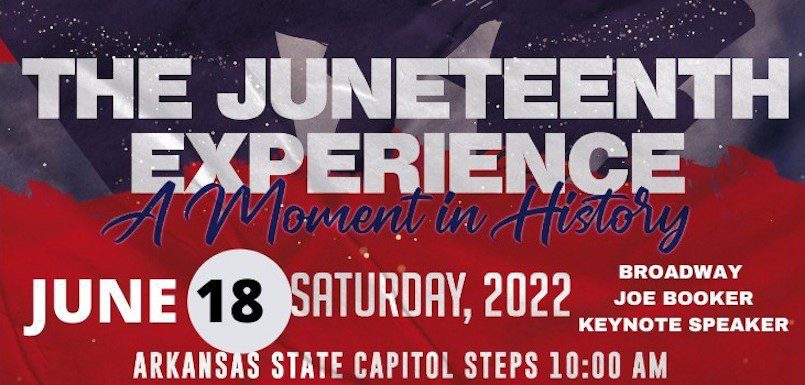06 Jun 2022 Juneteenth holiday celebration at capitol
LITTLE ROCK — The Arkansas Martin Luther King, Jr. (MLK) Commission invites the public to attend a commemorative program, “Juneteenth the Experience: A Moment in History,” at 10 a.m. on Saturday, June 18, Arkansas State Capitol Steps. The keynote speaker is Broadway Joe Booker, a broadcaster for Power 92 who has been recognized for his contributions hosting inaugural Juneteenth Celebrations in Central Arkansas. The event is free and open to the public. Highlights will include commemorative reflections, artistic presentations by youth performing arts groups, and a theatrical presentation of the events leading up to Juneteenth.

Known as America’s second Independence Day, Juneteenth is a special celebration for communities around the U.S. A combination of “June” and “nineteenth,” Juneteenth is a holiday that recognizes when slaves were informed that they were free, two years after the Emancipation Proclamation of 1863.
On June 19,1865, two and a half years after President Lincoln’s Emancipation Proclamation, Union soldiers led by Major General Gordon Granger, rode into Galveston, Texas, with news the war had ended and the slaves in Texas were free. Juneteenth is the oldest known celebration commemorating the end of slavery in the country. In 2021, President Joe Biden recognized Juneteenth as a federal holiday.
“Juneteenth is a celebratory event however, we want to educate audiences, focus on the historical aspect, and the significance of Juneteenth,” said DuShun Scarbrough, executive director of the MLK Commission. “This is our opportunity to educate youth who will be in attendance and connect them to the history, legacy, and heritage of Juneteenth. We want attendees to walk away with an understanding of the Juneteenth holiday and why we are celebrating it.”
The mission of the MLK Commission, a division of the Arkansas Department of Education, is to promote and preserve the life and legacy of Dr. King in the state; and to promote the principles of nonviolence and equality among all citizens. Community outreach projects are designed to promote education, an appreciation for history, and to encourage youth to engage in positive leadership development and roles within their communities.









